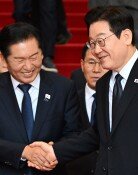Jo`s visit U.S. exceeds expectations
Jo`s visit U.S. exceeds expectations
Posted October. 12, 2000 11:17,
A new chapter is opening in the relationship between the United States and North Korea. The visit of Jo Myong-Rok, first vice chairman of the National Defense Commission, to Washington, D.C., led to an agreement to end hostile relations between the two countries.
Along with the progress in inter-Korean relations, the detente between Washington and Pyongyang has brought about a vast change in the remaining bilateral relationship that constituted the edifice of the Cold War on the Korean Peninsula.
In the midst of evolving rapprochement between the two parts of divided Korea with the June 15 summit between President Kim Dae-Jung of South Korea and National Defense Commission Chairman Kim Jong-Il of the North as the catalyst, the quickened pace of the search for normalized ties between Washington and Pyongyang got underway to strengthen stability and peace on the Korean Peninsula. The activity of Jo, who was the first ranking North Korean official to meet with President Bill Clinton and Secretary of State Madeleine Albright to pave the way for improved U.S.-North Korean ties, has had a great impact upon Seoul, as well as the two countries concerned.
Jo's accomplishment this time far exceeded the original expectation. At first, the visit was valued for its historical and symbolic significance. The diplomatic community in Washington was surprised to learn that Albright soon is to visit North Korea and that Clinton expressed his interest in working with Chairman Kim toward ameliorating bilateral relations. If the proposed visit by President Clinton to Pyongyang this year, as reported by USA Today, comes to pass, the normalization of bilateral ties would be a matter of time.
Albright told Vice Marshal Jo during a dinner hosted by Jo on Oct. 11 that she was so pleased that so much had been done together in the short stay of Jo in the United States.
Because the visit was made at the request of North Korea, it might well be assumed that its well calculated diplomatic thrust yielded much fruit to its advantage. Jo's act of changing his dress into military uniform when he paid a courtesy call on Clinton at the White House on Oct. 10 is construed to be a multi-purpose tactic.
He obviously sought to demonstrate to the outside world the North Korean military is behind Kim Jong-Il in his drive toward change and opening up, while letting the military at home recognize the pioneering role of the military in making a historical breakthrough in Pyongyang's relations with Washington. By so doing he meant to assuage and co-opt the People's Army, which had been reluctant to collaborate.
In case Albright visits North Korea, the bilateral talks going on between special U.S. envoy Charles Kartman and Vice Foreign Minister Kim Kye-Gwan would be upgraded. These developments would mean the Perry Process, based on the recommendation made by former policy coordinator on North Korea William Perry last September, will be in place. At that time, Perry suggested that Seoul, Washington and Tokyo improve their ties with Pyongyang in return for the latter's cancellation of missile tests.
Vice Marshal Jo made it clear that his U.S. visit resulted from the successful summit meeting of the two Koreas while the United States also concurred in stressing the importance of inter-Korean reconciliation. These pronouncements dispelled some misgivings that an improved U.S.-North Korea relationship might isolate South Korea. The failure of the United States and North Korea in resolving issues related to getting the latter off the list of states sponsoring terrorism and missile development illustrates the difficulty of tackling their pending agenda.
No matter what, the United States and North Korea have crossed the river, and moved toward rapprochement; there seems to be no turning back. Observers agree that this tide of the times will be here to stay regardless of the outcome of the U.S. presidential election next month.





![트럼프의 그린란드 병합 의지, ‘이 사람’이 불씨 지폈다[지금, 이 사람]](https://dimg.donga.com/c/138/175/90/1/wps/NEWS/IMAGE/2026/01/20/133193287.1.jpg)

